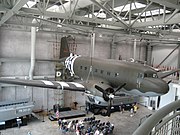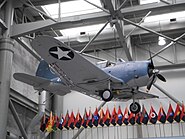| National World War II Museum | |
|---|---|
 Main Entrance | |
| Established | June 6, 2000 |
| Location | New Orleans, Louisiana |
| Visitors | 406,251 (2010)[1] |
| Website | http://www.nationalww2museum.org/ |
The National World War II Museum, formerly known as the National D-Day Museum, is a museum located in the Central Business District of New Orleans, Louisiana, at the corner of Andrew Higgins Boulevard and Magazine Street. It focuses on the contribution made by the United States to victory by the Allies in World War II, and the Battle of Normandy in particular. It was designated by the U.S. Congress as "America's National World War II Museum" in 2003,[2] and the museum maintains an affiliation with the Smithsonian Institution.[3] The mission statement of the museum emphasizes the American experience in World War II.[4]
Museum description[]

A C-47 on display in the museum atrium
The museum opened on June 6, 2000, the 56th anniversary of D-Day. The museum has a large atrium where aircraft including a Supermarine Spitfire, Messerschmitt Bf 109, Douglas SBD Dauntless dive bomber, and Douglas C-47 Skytrain are suspended from the ceiling. The building is several stories high and consists of two multi-level sections which are connected only by the main floor atrium. The museum does not solely discuss the invasion of Normandy, but also represents the Allied strategy of island hopping, culminating with nuclear attacks on Hiroshima and Nagasaki in August 1945.
The museum has several permanent galleries, including the Home Front, Planning for D-Day, The D-Day Beaches, and Pacific D-Days galleries. The third floor of the Louisiana Memorial Pavilion includes an observation deck for viewing the hanging aircraft. The second floor has reserved space for visiting exhibits and for special exhibits that change every few months. In January 2013, the museum opened its newest exhibit, The US Freedom Pavilion: The Boeing Center, which is the largest building on the museum campus.[5] The collection in the US Freedom Pavilion includes a B-17E Flying Fortress bomber, a B-25J Mitchell bomber, a SBD-3 Dauntless, aTBF Avenger, a P-51D Mustang, Corsair F4U-4 and an interactive submarine experience based on the final mission of the USS Tang.[5] The B-17E is the airplane dubbed My Gal Sal, famous for having been lost in a mission over Greenland and recovered 53 years later.[5] The The US Freedom Pavilion was paid for with a $15 million donation from the Boeing Company and with a $20 million grant from the US Department of Defense with Congressional approval.[6] Two other pavilions are under construction or planning as of 2013.[5]
Visitors to the museum are encouraged to allocate roughly 2½ to 3 hours to tour the museum. An award-winning 4-D film, Beyond All Boundaries, gives the visitor an overview of the war on every front. A variety of other multimedia displays are part of the museum's exhibits, notably dozens of video oral histories conducted with veterans by museum staff. The museum currently includes two restaurants, the American Sector and the Soda Shop, both operated by noted chef John Besh. The museum sponsors a wargaming club and holds a wargame convention each year called "Heat of Battle".
Relation to New Orleans[]

Artillery and a "Higgins Boat" on display in the museum lobby
Some may wonder why The National World War II Museum is located in New Orleans, a city known for other tourism sites but which is not usually associated with 20th-century military history. The museum opened as the D-Day Museum, focusing initially on the amphibious invasion of Normandy, then opening a second gallery exploring the amphibious invasions of the Pacific War. As the Higgins Boats vital to D-Day operations were designed, built, and tested in New Orleans by Higgins Industries, the city was the natural home for such a project. Furthermore, New Orleans was the home of historian Stephen Ambrose, who spearheaded the effort to build the museum.
The Museum closed for three months after Hurricane Katrina ravaged New Orleans in 2005, re-opening on December 3 of that year. A museum banner promoted this re-opening by proclaiming "We Have Returned," a phrase made famous by General Douglas MacArthur regarding his eventual return to the Philippines in 1944. As of 2012, the Museum is in the midst of a $300 million capital expansion campaign called The Road to Victory: A Vision for Future Generations. The expansion has resulted in significant increases in attendance.[7] The Solomon Victory Theater, Stage Door Canteen, and American Sector restaurant opened in November 2009. The John E. Kushner Restoration Pavilion opened in June 2011.[8][9] The final two projects in the expansion will be the Campaigns of Courage Pavilion, and the Liberation Pavilion. The museum hopes to complete its expansion by 2015.
Gallery[]
See also[]
- National D-Day Memorial
- Museum of World War II
- National Museum of the Pacific War
- National World War II Memorial
- United States Marine Corps War Memorial (Iwo Jima)
- National World War I Museum
- National Civil War Museum
- Museum of the Great Patriotic War, Moscow
- Museum of the Great Patriotic War, Kiev
- Imperial War Museum
- La Coupole World War II Museum
- United States Holocaust Memorial Museum
- Andrew Higgins
References[]
- ↑ "Top Construction Projects 2012". New Orleans CityBusiness. 2012-02-24. http://www.pageturnpro.com/New-Orleans-CityBusiness/36444-Top-Construction-Projects-2012/index.html#10. Retrieved 2012-03-22.
- ↑ Roberts, Deon (2005-09-22). "D-Day Museum in New Orleans plans expansion". New Orleans CityBusiness. http://findarticles.com/p/articles/mi_qn4200/is_20050822/ai_n14915268/. Retrieved 2009-06-09.
- ↑ List of museums affiliated with the Smithsonian Institution
- ↑ Mission Statement of the National World War II Museum
- ↑ 5.0 5.1 5.2 5.3 National World War II Museum press release of January 13, 2013.
- ↑ D. MacCash, New Orleans Times-Picayune, January 9, 2013.
- ↑ National WWII Museum Sees Busiest Month Ever, 11 April 2012. Accessed 9 May 2012.
- ↑ New Orleans Times Picayune report on the opening of the John E. Kushner Restoration Pavillion
- ↑ National WW II Museum published expansion plans, accessed June 5, 2011.
External links[]
| Wikimedia Commons has media related to National World War II Museum. |
- The National World War II Museum website
- Museum World War II Italy
- Museum of World War II, Natick, MA, USA
- The Eldred World War II Museum
- World War II Museums in Normandy, France
- National Vietnam War Museum
- Official website of New Orleans Museums
- National Civil War Museum
Coordinates: 29°56′35.30″N 90°04′13.26″W / 29.943139°N 90.07035°W
The original article can be found at National World War II Museum and the edit history here.










